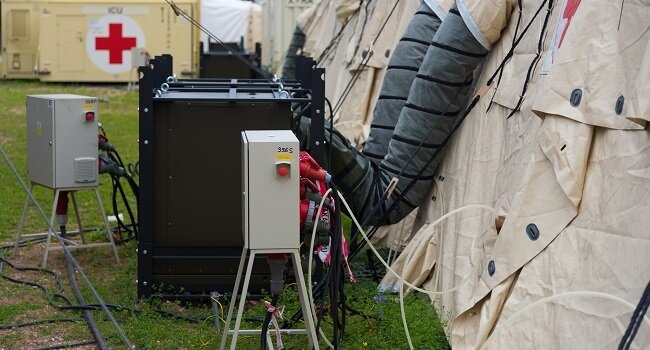Temporary field hospitals are often set up in response to emergencies, natural disasters, pandemics, or in conflict zones, where traditional hospital facilities are unavailable, overwhelmed, or non-existent.┬Ā┬Ā
These hospitals must be rapidly deployable, adaptable to diverse environments, and capable of providing acute care under less-than-ideal conditions. Temperature management in such settings becomes a multifaceted challenge, impacting various aspects of healthcare delivery.┬Ā
Patient Health And Recovery┬Ā
In environments where patients are already vulnerable, controlling the temperature can mean the difference between recovery and further health complications.┬Ā┬Ā
In hot climates, for instance, a field hospital might utilize evaporative coolers or air-conditioned tents to provide a cooler environment for heatstroke victims.┬Ā┬Ā
This not only helps in reducing body temperature but also mitigates the risk of heat exhaustion among other patients and staff.┬Ā┬Ā
In cold settings, portable heaters and thermal blankets are essential for maintaining body temperature, especially for patients in shock or those with severe injuries who are at risk of hypothermia.┬Ā┬Ā
Additionally, thermal insulation of medical tents can prevent heat loss and maintain a stable environment conducive to patient recovery.┬Ā
Infection Control┬Ā
An environmental control unit is crucial for managing temperature and humidity, playing a pivotal role in infection prevention and control.┬Ā
During the Ebola outbreak, for instance, temporary field hospitals used specialized tents with controlled ventilation systems to maintain a dry and cool environment. This reduced the Ebola virus’ survivability outside the human body.┬Ā┬Ā
Such measures are crucial not only for patient areas but also for sections of the hospital where medical waste is processed and stored.┬Ā┬Ā
Maintaining lower humidity levels can also reduce the proliferation of mold and other fungi, which can cause respiratory infections and compromise the sterile environment necessary for patient care.┬Ā
Medication And Vaccine Efficacy┬Ā
The integrity of vaccines and medications is paramount, particularly in response to outbreaks or in vaccination campaigns.┬Ā┬Ā
Portable, solar-powered refrigeration units offer a sustainable solution for maintaining the cold chain in remote or resource-limited settings. These units can be used to store temperature-sensitive medications, including insulin and some antibiotics, ensuring they remain effective until they reach the patient.┬Ā┬Ā
During the COVID-19 pandemic, the deployment of these refrigeration units in field hospitals and vaccination sites ensured that vaccines remained within their required temperature range, preventing spoilage and ensuring the success of mass vaccination efforts in challenging environments.┬Ā
Equipment Functionality┬Ā
Humidity and temperature control are critical for the proper function of medical equipment. High humidity levels can cause condensation on electronic components, leading to corrosion and malfunction.┬Ā┬Ā
In a tropical field hospital setting, dehumidifiers and air conditioning units are employed for patient comfort. Additionally, they create an environment where delicate diagnostic equipment like PCR machines used for testing infectious diseases can operate reliably. This ensures accurate diagnostics and effective patient treatment plans.┬Ā
Staff Performance And Comfort┬Ā
The well-being of healthcare workers directly impacts the quality of care provided to patients. In hot climates, rest areas equipped with cooling systems allow staff to take breaks and recover from the heat, ensuring they remain alert and efficient.┬Ā┬Ā
Hydration stations, cooling vests, and access to shaded or air-conditioned rest areas are examples of measures that can be implemented to protect staff from heat stress, thereby maintaining high levels of patient care and operational functionality.┬Ā
Overall Operational Efficiency┬Ā
The deployment of energy-efficient and adaptable temperature management solutions directly influences the sustainability and effectiveness of field hospital operations.┬Ā┬Ā
For instance, insulated medical tents designed for easy assembly and mobility can maintain internal temperatures more effectively without excessive energy consumption.┬Ā┬Ā
Solar-powered HVAC systems reduce dependence on local power grids or generators, which can be unreliable or scarce in disaster-affected areas.┬Ā┬Ā
These solutions not only ensure the continuous provision of healthcare services but also minimize operational costs and environmental impact.┬Ā
Challenges And Solutions┬Ā
Temperature management in field hospitals presents several challenges, particularly due to the temporary and often rapidly deployed nature of these facilities. Here are some common problems and potential solutions:┬Ā
- Variable and Extreme Environmental Conditions┬Ā
Field hospitals are often deployed in diverse environments that can range from extreme heat to cold.┬Ā┬Ā
Deploying innovative shelter designs, such as insulated and reflective temporary structures, can help adapt to extreme temperatures. Modular insulation and ventilation adaptations can further tailor these environments to specific needs.┬Ā
- Limited Infrastructure┬Ā
The lack of existing infrastructure, including electricity and HVAC systems, complicates efforts to maintain stable temperatures.┬Ā
Utilizing portable power sources, such as solar-powered generators and portable HVAC systems, allows for the establishment of temperature control without relying on local infrastructure.┬Ā
- Resource Constraints┬Ā
Field hospitals operate with limited resources, including power, water, and medical supplies. This scarcity impacts the ability to implement comprehensive temperature management solutions.┬Ā
Implementing energy-efficient cooling and heating technologies, such as LED lighting and low-energy HVAC systems, maximizes the use of limited resources like power and fuel.┬Ā
By focusing on adaptable and sustainable solutions, healthcare providers can overcome these obstacles, ensuring effective patient care even in the most demanding conditions.┬Ā
Takeaway┬Ā
Effective temperature management in field hospitals goes beyond ensuring comfort; it’s a critical factor that affects patient recovery, the preservation of medications, and the well-being of healthcare workers.┬Ā

By focusing on the significance of temperature in these settings, field hospitals can improve patient outcomes, safeguard critical supplies, and support the dedicated individuals who work within them.


















